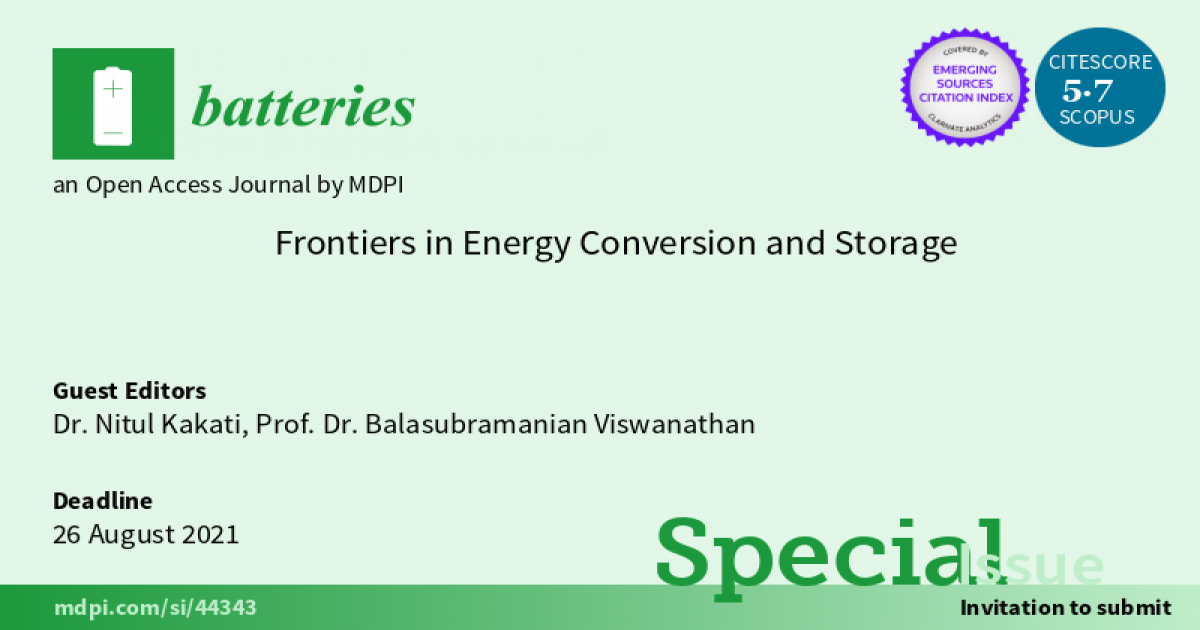Frontiers in Energy Conversion and Storage
A special issue of Batteries (ISSN 2313-0105).
Deadline for manuscript submissions: closed (26 August 2021) | Viewed by 863

Special Issue Editors
Interests: PEMFC; DMFC; direct urea fuel cell; electrode materials for fuel cell and rechargeable batteries; water electrolysis
Special Issues, Collections and Topics in MDPI journals
Interests: catalysis; fuel cell; battery; supercapacitor; electrolysis
Special Issues, Collections and Topics in MDPI journals
Special Issue Information
Dear Colleagues,
The topic of energy conversion and storage is of great current relevance in providing a sustainable society. Essentially, this topic can cover the whole science, but the four molecules of relevance are carbon dioxide, carbon monoxide, dinitrogen, and water. If one can manipulate these four molecules at will, many of the energy conversion and storage will become affordable. Even though this will form one of the main topics of focus for this Special Issue, other topics such as the current levels of development of fuel cells, designing capacitor materials, and advances in the battery configurations will also be of interest. In addition, the conventional reactions such as ORR and OER will also receive attention in this Special Issue because of the possibility of unraveling the life process, which also depends on energy conversion and storage. New electrochemical devices such as sensors and others indicating communicating devices also depend on the method of energy conversion and storage, and hence, this Special Issue assumes timely relevance. This issue will include but not be limited to the following topics:
-Fuel cells (electrode materials, membranes, catalytic reactions, electrochemical processes and technology);
-Batteries (electrode materials, battery electrochemistry, primary and secondary batteries);
-Electrochemical capacitors (supercapacitors, interface science, electrical double layer);
-Electrolysis (water, carbon dioxide and nitrogen reduction).
Dr. Nitul Kakati
Prof. Dr. Balasubramanian Viswanathan
Guest Editors
Manuscript Submission Information
Manuscripts should be submitted online at www.mdpi.com by registering and logging in to this website. Once you are registered, click here to go to the submission form. Manuscripts can be submitted until the deadline. All submissions that pass pre-check are peer-reviewed. Accepted papers will be published continuously in the journal (as soon as accepted) and will be listed together on the special issue website. Research articles, review articles as well as short communications are invited. For planned papers, a title and short abstract (about 100 words) can be sent to the Editorial Office for announcement on this website.
Submitted manuscripts should not have been published previously, nor be under consideration for publication elsewhere (except conference proceedings papers). All manuscripts are thoroughly refereed through a single-blind peer-review process. A guide for authors and other relevant information for submission of manuscripts is available on the Instructions for Authors page. Batteries is an international peer-reviewed open access monthly journal published by MDPI.
Please visit the Instructions for Authors page before submitting a manuscript. The Article Processing Charge (APC) for publication in this open access journal is 2700 CHF (Swiss Francs). Submitted papers should be well formatted and use good English. Authors may use MDPI's English editing service prior to publication or during author revisions.
Keywords
- Energy Conversion & Storage, Renewable Energy
- Fuel Cell
- Catalysis, electrode
- membrane
- battery
- supercapacitor
- electrolysis
- oxygen reduction reaction
- oxygen evolution reaction.






